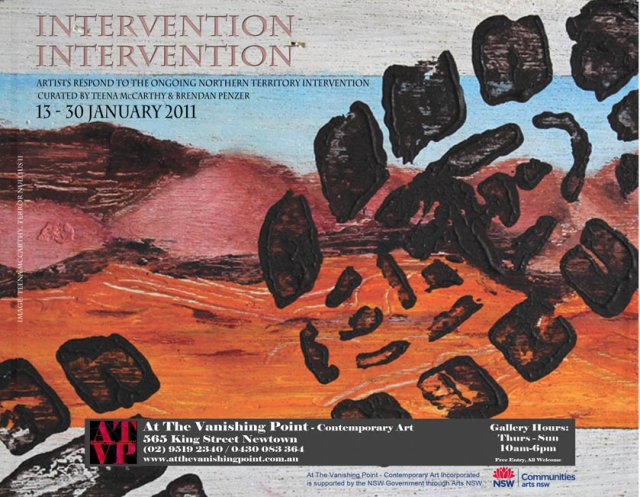
iNTervention Intervention
Curated by Teena McCarthy & Brendan Penzer
The Vanishing Point gallery
565 King Street, Newtown, Sydney
January 13-30
“The time has now come for the nation to turn a new page in Australia’s history by righting the wrongs of the past and so moving forward with confidence to the future....
“We apologise especially for the removal of Aboriginal and Torres Strait Islander children from their families, their communities and their country....
“And for the indignity and degradation thus inflicted on a proud people and a proud culture, we say sorry.”
With these emotional words, uttered by then-PM Kevin Rudd in 2008, many Australians imagined the rift between the Aboriginal people and the rest of Australia was healed.
iNTervention Intervention brings the spotlight back on a crucial but rarely discussed political issue. It is an art exhibition featuring responses by artists to the ongoing Northern Territory intervention into Aboriginal communities
Eighteen artists (three of whom live in the NT) engage with the controversial set of policies initiated by the Howard government and intensified by Rudd.
iNTervention Intervention reminds us of the horrific circumstances that many Australian Indigenous people live under. Sinem Saban and Damien Curtis' compelling documentaryOur Generation noted the life expectancy for Aboriginal people is 17 years less life expectancy than other Australians.
There is also 40 times the incidence of Type 2 diabetes, an illness unheard of before colonisation.
But the show goes further than these familiar statistics, giving a harrowing sense of the desperation in many Indigenous communities. The message is this: the ongoing impacts of colonisation are not merely relics of the past. Colonialism is happening now.
The buzzwords may have changed but the effect is the same: what was “assimilation” is now “a rescue operation”.
And the solution is not merely to create more and better funded health and education services, it’s about dignity — Aboriginal communities must be empowered to make their own decisions.
Any policy that takes this decision-making power out of their hands is paternalistic and top-down and, ultimately, will fail.
Between disturbing shots of Third World-style, overcrowded houses in remote NT, and interviews with Aboriginal people about the impact of the Intervention, “Our Generation” demonstrates how for decades, Aboriginal communities have been under the control of government bureaucrats in city offices thousands of kilometres away.
Under the guise of correcting social dysfunction in Aboriginal communities, successive governments have desecrated the one thing that thriving communities require: empowerment.
Both Labor and Liberal governments used the 2007 The Little Children are Sacred report, which outlined serious problems of child abuse and neglect in remote NT Aboriginal communities, as a justification to impose the Intervention.
Meanwhile, the intervention ignored all of the report’s recommendations, including that “genuine consultation with Aboriginal people” be conducted before any policy changes.
The ensuing sense of anger and mistrust of authority is forcefully expressed in Elaine Syron's photographic collage “Sydney People Care...”
Scrawled text spills off the boundaries of the collaged images of Aboriginal achievement and resistance, and twists and turns unapologetically onto the pristine gallery walls: “Build Aboriginal housing, not air-conditioned police stations.....Income management is an issue for all Australians.”
The satirical “Basics Card” ridicules the apartheid-like income management technique that prescribes how and where Aborigines in the NT spend their welfare payments.
Brendan Penzer’s take on the card declares: “The citizen in possession of this Basics Card has had enforced upon them the loss of all; basic human rights, basic human dignity, and basic services by his/her government. This card is designed to shame, stigmatise and marginalise the person who holds it.
“The NT Intervention contravenes 25 articles under the United Nations Declaration on the Rights of Indigenous Peoples and 20 articles under the Universal Declaration of Human Rights.
“The Intervention, rolling out across Australia soon.”
Jason Wing’s performative work “An Australian government initiative” emphatically deals with how the Intervention has stigmatised an already stigmatised group of people.
The words “CRIMINAL” and “RAPIST” sit uncomfortably on Australian government-branded signs, which are worn around the neck. It’s a simple, conceptual work that hits hard.
Gordon Syron’s violent, voluminous and expressionistic brushstrokes in “Remember 1788”, and textual declaration of “Terror Nullius”, reminds us of the true significance of Australia Day to Indigenous people.
It’s a striking commemoration of a time which most Australians will shortly celebrate by taking a day off to get completely drunk, fly Aussie flags and watch fireworks.
As Australia Day comes around once more, iNTervention Intervention is a bold contribution to the discussion of how to deal with Australia’s chronically and institutionally abused Aboriginal communities
It is also a reminder that these abuses are not in the past. Colonialism didn’t just obliterate Aboriginal tribes, lives, culture, land, laws, customs and languages — it decimated Aboriginal peoples’ sense of dignity and wholeness.
This show is not polite. It’s engaging and fierce, and all the artists take an audacious approach to their subject matter.
It is also perhaps the first show that takes up the intervention. Hopefully it marks the start of a conversation between the art world and the rest of society about this subject.
Emphatic and expressive, many of the artists’ works are borne out of a firsthand experience of the quiet violence taking place in the NT, and are a warning against complacency.
Whatever your opinion of the intervention, this show will inform and provoke.